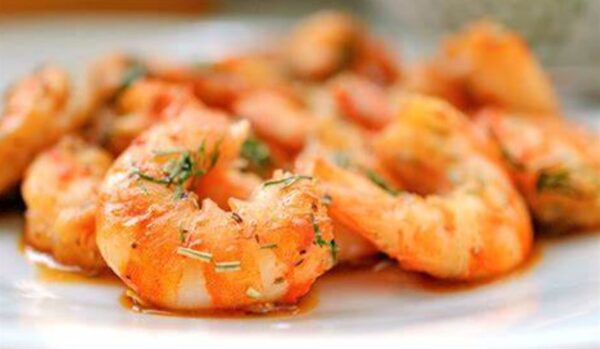49 Views

Prawns are a delicious, protein-packed seafood delicacy enjoyed in various cuisines worldwide.
They are rich in vitamins, minerals, and omega-3 fatty acids, offering numerous health benefits.
However, when paired with certain foods, prawns can cause digestive discomfort, allergic reactions, or even food poisoning.
In this article, we’ll discuss foods you should avoid consuming after eating prawns to prevent adverse reactions and ensure optimal digestion.
1. Citrus fruits
Citrus fruits like oranges, lemons, and grapefruits are highly acidic and can cause digestive discomfort when consumed immediately after prawns. Prawns are rich in proteins and require more time to digest, whereas citrus fruits tend to increase acidity in the stomach. When eaten together, they can lead to an upset stomach, acid reflux, or heartburn. In some individuals, this combination can also trigger allergic reactions. Increased acidity can irritate the digestive system. Slower digestion of prawns when paired with acidic foods may cause bloating or indigestion.
2. Dairy products
Dairy products such as milk, cheese, and yogurt should also be avoided after prawns. Combining prawns with dairy can interfere with the digestive process. Dairy is heavy on the stomach, and when combined with the protein in prawns, it can lead to indigestion, bloating, or gas. Additionally, for individuals with lactose intolerance, this combination may trigger stomach cramps, diarrhea, or nausea. Difficulty digesting proteins from both prawns and dairy at the same time. Increased risk of gastrointestinal issues like bloating, cramps, and gas.
3. Foods high in vitamin C
While vitamin C is essential for overall health, consuming foods rich in this vitamin, such as kiwi, strawberries, or bell peppers, immediately after prawns can pose risks. Vitamin C is an antioxidant that can potentially react with the proteins in prawns and cause food poisoning symptoms like nausea, vomiting, and abdominal discomfort. The combination can also lead to allergic reactions, especially in individuals with seafood allergies. Potential reactions between the high protein content of prawns and vitamin C, causing digestive discomfort. Increased risk of foodborne illnesses, especially in individuals with sensitivities to seafood.
4. Sweet foods and desserts
Consuming sweet foods like ice cream, cakes, or sugary beverages right after prawns is another combination to avoid. The rich proteins from prawns take longer to digest, and consuming sugary foods immediately after can slow down digestion. This mismatch can result in a bloated, heavy feeling, and in some cases, discomfort or even diarrhea. Sugary foods can also alter the stomach’s pH balance, which could interfere with the absorption of nutrients from prawns. Slow digestion when protein and sugar are combined. Stomach discomfort like bloating or indigestion.
Drinking alcohol, particularly wine, beer, or spirits, after eating prawns can have adverse effects on your digestive system. Alcohol increases the production of stomach acids and can irritate the digestive lining, while prawns are protein-rich foods that take time to break down. Consuming alcohol after prawns may exacerbate indigestion, acid reflux, and other gastrointestinal issues. Additionally, alcohol may intensify allergic reactions for those sensitive to shellfish. Increased stomach acid production, which can irritate the digestive tract and cause discomfort. Increased risk of allergic reactions and foodborne illness, especially in those with shellfish allergies.
6. Cold drinks
Drinking cold beverages, especially carbonated drinks or iced water, immediately after eating prawns can negatively affect digestion. Cold drinks can slow down the digestion process, making it harder for your body to break down the protein in prawns effectively. Moreover, consuming carbonated drinks can lead to bloating and discomfort as they introduce gas into the digestive system, which can make you feel full or gassy. Slows down digestion, making it harder for your body to break down prawns. Gas formation in the stomach from carbonated drinks can lead to bloating and discomfort.
7. Beans and lentils
Beans, lentils, and other legumes are high in fiber and require a longer digestion time. Pairing these with prawns can cause discomfort because both the protein in prawns and the fiber in legumes require different enzymes to digest. This combination can slow down the digestive process, leading to bloating, gas, and indigestion. Additionally, some legumes can interfere with the absorption of nutrients from prawns, reducing their overall health benefits. Slow digestion of both proteins and fibers can cause bloating and discomfort. Interference with nutrient absorption, reducing the benefits of both foods.
Starchy foods like potatoes, rice, and bread should be avoided after prawns, as combining protein-rich prawns with starch can lead to sluggish digestion. Starch and protein are digested at different rates, which may cause the digestive system to work harder to break down both at the same time. This imbalance can cause bloating, indigestion, and a feeling of heaviness. The combination may also lead to a spike in blood sugar levels, followed by a crash, making you feel fatigued. Slow and inefficient digestion due to the different digestion rates of proteins and starches. Increased feeling of fullness and discomfort after eating.
9. Tannins in tea
While tea is a popular beverage worldwide, drinking tea, especially green tea or black tea, after consuming prawns can cause digestive issues. Tea contains tannins, which can bind with the proteins in prawns and hinder the body’s ability to digest them effectively. This can lead to an upset stomach, indigestion, or even nausea. Additionally, tannins can interfere with the absorption of iron from prawns, reducing their nutritional value. Tannins in tea can bind with proteins and hinder digestion. Inhibition of iron absorption, reducing the nutritional benefits of prawns.
